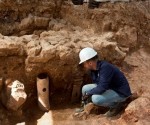Arqueólogos griegos aseguran haber encontrado tumba de Aristóteles

(English version at the end of text)
Arqueólogos griegos anunciaron el hallazgo del mausoleo del filósofo Aristóteles en su ciudad natal, la norteña Estagira, según informaciones del periódico The Independent.
El director de las obras de excavación, Konstandinos Sismanidis, presentó los resultados del trabajo de los arqueólogos en el congreso internacional ‘Aristóteles, 2.400 años’, celebrado en la Universidad de Salónica.
De acuerdo con Sismanidis, gracias a “pruebas circunstanciales” ya se puede afirmar que una construcción descubierta en 1996 es la tumba de Aristóteles.
El mausoleo está situado entre una galería del siglo V a. C. y un templo de Zeus del siglo VI a. C., dentro de la antigua ciudad, cerca de su ágora.
Según los arqueólogos, la ubicación de la tumba muestra la importancia que tenía para la ciudad la persona enterada en ella. En el interior del sepulcro no se encontraron restos humanos. La propia tumba fue destruida en la época del Imperio bizantino.
(Tomado de RT en Español)
----------------
Greek archaeologists claim to have found tomb of Aristotle
Greek archaeologists announced the discovery of the mausoleum of the philosopher Aristotle in his hometown, the northern Estagira, according to reports The Independent newspaper.
The director of the excavation, Konstandinos Sismanidis, presented the results of the work of archaeologists at the international congress' Aristotle, 2,400 years, "held at the University of Thessaloniki.
According to Sismanidis, thanks to "circumstantial evidence" and we can say that a construction discovered in 1996 is the tomb of Aristotle.
The mausoleum is located between a gallery V century. C. and a temple of Zeus the sixth century. C., inside the old city, near the agora.
According to archaeologists, the location of the tomb shows the importance for the city insider her. Inside the tomb, they found no human remains. The tomb itself was destroyed at the time of the Byzantine Empire. (From RT in Spanish)(Translated by Google)
0 comentarios